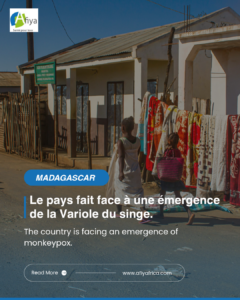Africa, a continent rich in cultural diversity and health challenges, saw the emergence and impact of many exceptional personalities in the field of health in 2024. These leaders, whether doctors, researchers, activists or political decision-makers, have played a major role in improving the health conditions of African populations. From the fight against infectious diseases to the promotion of mental health, these 50 personalities have left an indelible mark on 2024.

1- Dr. Matshidiso Moeti (Botswana): first woman to hold the post of WHO Regional Director for Africa. She led the transformation of the WHO Africa Regional Office into an accountable, results-oriented organization. During this period, WHO Africa focused on improving health security, universal health coverage and supporting countries in the implementation of MDG3. Dr. Moeti has over 35 years’ experience in public health.

2- Dr. Tedros Adhanom Ghebreyesus (Ethiopia): public health expert and Ethiopian diplomat, currently Director-General of the World Health Organization (WHO) since July 1, 2017. He is the first African to hold this position. Before joining the WHO, he was Minister of Health in Ethiopia from 2005 to 2012. He played a major role in global health, including the management of major health crises such as the Ebola epidemic and the COVID-19 pandemic. He has been recognized for his efforts to improve access to healthcare and health outcomes in Africa.

3- Dr Jean Kaseya (DRC): is a physician and public health expert from the Democratic Republic of Congo, currently Director General of the African Centers for Disease Control and Prevention (Africa CDC). He took up his post in April 2023, succeeding Dr John Nkengasong. With over 25 years’ experience in public health, both nationally and internationally, he is recognized for his contributions to health initiatives in Africa. As head of Africa CDC, he focuses on strengthening health security, improving governance and optimizing the continent’s response to health crises.

4- Dr Mamphela Ramphele (South Africa): South African activist, physician, academic and businesswoman. She is known for her anti-apartheid activism and her contributions to education and public health in Africa. She co-founded the Zanempilo Community Health Centre, located near King William’s Town, to provide primary health care to black communities. She has worked on initiatives focusing on equitable access to healthcare, health education and community development. She has advocated inclusive health policies and contributed to global discussions on health inequalities.

5- Prof. Halidou Tinto (Burkina Faso): a renowned scientist specializing in malaria research. He is regional director of the Institut de Recherche en Sciences de la Santé (IRSS) in Nanoro, Burkina Faso. He is also the principal investigator for clinical trials on the R21/Matrix-M malaria vaccine, developed in collaboration with Oxford University. This second-generation vaccine has raised great hopes thanks to its efficacy. His work has improved knowledge of treatments and vaccines for this disease. He was named “Best Scientist of the Year” by the International Achievements Research Center, in recognition of his outstanding contributions to scientific research and public health. Prof. Tinto is an emblematic figure in African research, and his work is helping to position Burkina Faso as a key player in the fight against infectious diseases.

06- Dr. Awa Marie Coll-Seck (Senegal): A former Minister of Health, she was active in 2024 in promoting maternal and child health in Senegal. She launched programs to reduce maternal mortality by improving access to prenatal and postnatal care. Its advocacy has led to a significant increase in funding for reproductive health services. She continues to play an advisory role to international organizations on health issues.

07- Olfa Gam (Tunisia): Managing Director of Cytopharma, a company specializing in biotechnology and drug production. In 2024, she was recognized by Forbes Middle East as one of the 100 most influential people in the healthcare sector in the Middle East and North Africa. Under her leadership, Cytopharma has developed innovative solutions for the treatment of chronic diseases. His commitment has contributed to improving access to healthcare in Tunisia.

08- Dr. Mamy Lalatiana Andriamanarivo (Madagascar): A former Minister of Public Health in Madagascar, in 2024 he continued to play a key role in the reform of the Malagasy healthcare system. He initiated programs to improve access to healthcare in isolated rural areas. Its commitment also focused on the fight against endemic infectious diseases in Madagascar. He has worked with international partners to strengthen the country’s health capabilities.

09- Dr. Amina Ben Salem (Morocco): Director of the Centre National de Transfusion Sanguine, in 2024 she led national campaigns to encourage blood donation. Under her leadership, Morocco achieved self-sufficiency in blood products for the first time. It has also set up training programs for medical personnel specialized in transfusion. Her work has strengthened transfusion safety in the country.

10- Professor Abdoulaye Diabaté (Burkina Faso): Director of the Department of Medical Entomology and Parasitology at the Institut de Recherche en Sciences de la Santé (IRSS/DRO), he is recognized for his innovative research on malaria. In 2024, he was named one of the 100 most influential Africans by New African magazine. His TED talk entitled “How to defeat malaria once and for all” highlighted the potential of genetic modification of mosquitoes to eradicate the disease.

11- Dr Ahmed Ogwell Ouma (Kenya): public health expert and leader in global health. He has made significant contributions to health policy, health security and the prevention of non-communicable diseases. Dr. Ouma has been a fervent advocate of the New Public Health Order concept, a vision for Africa to take charge of its own health challenges and lead solutions adapted to its context. He has also collaborated with the World Health Organization (WHO) on tobacco control and non-communicable diseases, and held leadership roles in Kenya’s Ministry of Health. In 2024, he was appointed Vice President for Global Health Strategy at the United Nations Foundation, where he oversees global health policy, advocacy and grantmaking efforts in support of various health causes around the world.

12- Dr. Jean-Jacques Muyembe-Tamfum (Congo): renowned virologist, known for his co-discovery of the Ebola virus in 1976. He is currently Director General of the Institut National de Recherche Biomédicale (INRB) in the Democratic Republic of Congo (DRC). Throughout his career, he has played a key role in the fight against epidemics in Africa, including Ebola, COVID-19 and other infectious diseases.
This year, he received an Honorary Doctorate from Sorbonne University, in recognition of his outstanding contributions to biomedical research and public health. His landmark achievements include the development of Ebanga®, a monoclonal antibody approved by the FDA in 2020 to treat the Ebola virus. Dr. Muyembe is a fervent advocate of international scientific cooperation and investment in African institutions to strengthen research and the fight against emerging diseases.

13- Dr. Rose Gana Fomban Leke (Cameroon): a renowned scientist specializing in immunology and parasitology, with a particular focus on malaria. She is Professor Emeritus at the University of Yaoundé I and has devoted her career to research into parasitic infections, particularly malaria associated with pregnancy. Her work has led to a better understanding of the effects of malaria on the immune systems of pregnant women and newborns.
Her commitment to public health and her support for African women scientists make her an inspiring figure in the field of research and global health.

14 – Dr Mohammed Lamorde (Nigeria): expert in public health and clinical pharmacology. He is currently Head of the Global Health Security Program at the Institute of Infectious Diseases (IDI), Makerere University, Uganda. With a career focused on the medical management of infectious diseases in developing countries, he has played a key role in finding and implementing solutions for diseases such as HIV, tuberculosis and malaria.
He has also led initiatives to build clinical pharmacology capacity in Africa, helping to improve healthcare systems in developing countries.
Translated with DeepL.com (free version)

15- Sheila Dinotshe Tlou (Botswana): nurse and public health specialist, renowned for her expertise in HIV/AIDS and women’s health. She is a former Minister of Health in Botswana, where she played a key role in strengthening health systems and combating HIV/AIDS in the country.
She is also a nursing educator and has taught at the University of Botswana, where she contributed to the development of health sciences education programs. Currently, Dr. Tlou is co-chair of the Global HIV Prevention Coalition and the global Nursing Now campaign, which aims to promote the role of nurses in universal health coverage. In 2024, she continued to advocate universal access to healthcare in Africa.

16- Dr. Francisca Mutapi (Zimbabwe): a scientist specializing in immunology and neglected tropical diseases, in particular schistosomiasis. She is Professor of Global Health, Infection and Immunity at the University of Edinburgh, where she also co-directs the Global Health Academy. She is renowned for her research into the interactions between the human immune system and parasites, and for her contributions to the fight against tropical diseases in Africa. A renowned parasitologist, in 2024 she conducted research into neglected tropical diseases and their impact on African populations.

17- Dr. Nadia Mansour (Egypt): An obstetrician-gynecologist, in 2024 she initiated a national program to improve maternal health in Egypt. Thanks to her efforts, the maternal mortality rate has fallen significantly. She has also worked to develop policies to promote access to prenatal care for all women. Her commitment has transformed the way pregnant women are cared for in the country.
18- Dr. Karim Bensaïd (Algeria): An oncologist, in 2024 he introduced new targeted therapies for the treatment of cancer in Algeria. He has led clinical research into the efficacy of these treatments in the African context. His oncology center has become a national reference for the care of cancer patients. He has also advocated better care for terminally ill patients.

19- Dr Denis Mukwege (Congo): world-renowned gynecologist and human rights activist. Nicknamed “the man who repairs women”, he is the founder of the Panzi hospital in Bukavu, Democratic Republic of Congo. Since 1999, this hospital has become a treatment center for survivors of sexual violence used as a weapon of war. Dr Mukwege and his team have treated thousands of patients, offering not only medical care, but also legal, psychosocial and socio-economic support.
His courage and commitment continue to inspire millions of people around the world.

20- Dr. David Moinina Sengeh (Sierra Leone): biomedical engineer and politician, known for his significant contributions to healthcare and innovation. He has worked on personalized prostheses using 3D modeling technology, offering affordable and accessible solutions to amputees. These innovations have improved the quality of life of many people around the world.
As Minister of Education in Sierra Leone, he also played a key role in promoting technological innovation and data-driven healthcare. His work has led to the development of healthcare technologies adapted to the needs of African communities.

21- Dr. Helena Ndume (Namibia): world-renowned ophthalmologist, nicknamed “Miracle Doctor” for her outstanding work in the treatment of blindness and eye diseases. She also heads the ophthalmology department at Windhoek Central Hospital, Namibia’s largest hospital.
Her humanitarian commitment has earned her numerous distinctions, including the Nelson Mandela Award, in recognition of her dedication to restoring sight in developing countries

22- Graça Machel (Mozambique): an iconic figure, she has played a crucial role in the field of health, although she is not a health professional. She is a fervent advocate of universal access to healthcare, particularly for women and children. As a member of the Global Elders, a group founded by Nelson Mandela, she campaigns for equity in healthcare systems and universal health coverage.
She also founded the Foundation for Community Development in Mozambique, which supports community health initiatives and the fight against poverty.

23- Trevor Noah (South Africa): A comedian, he uses his platform to raise awareness of inequalities in access to healthcare. He uses his platform to raise awareness of social inequalities, including in healthcare. As a producer, he has worked on documentary projects that tackle important societal issues, such as civil rights, healthcare and humanitarian crises. His humor and global influence enable him to shed light on complex issues and mobilize attention for initiatives for change.

24- Folorunso Alakija (Nigeria): A businesswoman, in 2024 she financed breast cancer awareness and prevention campaigns in Nigeria. A Nigerian philanthropist, she is known for her commitment to social initiatives, including healthcare. She founded the Rose of Sharon Foundation, which supports widows and orphans with medical care, education and economic opportunities. She has also contributed to community health programs and awareness campaigns to improve access to healthcare in disadvantaged areas of Nigeria.

25- Tsitsi Masiyiwa (Zimbabwe): A philanthropist, in 2024 she launched initiatives to provide free healthcare for pregnant women in rural areas. Tsitsi Masiyiwa is a philanthropist and social entrepreneur from Zimbabwe, renowned for her commitment to healthcare. She is Chairman of the Board of the END Fund, an organization dedicated to the elimination of neglected tropical diseases (NTDs) in Africa, such as river blindness, lymphatic filariasis and schistosomiasis. She is also co-founder of the Higherlife Foundation, which supports initiatives in health, education and food security to improve living conditions in Africa.







OTHER ARTICLES
Editorial: AFCON – When Football Becomes a Major Public Health Lever in Africa
Cheaper drinks will see a rise in noncommunicable diseases and injuries
Madagascar is facing an emergence of Monkeypox